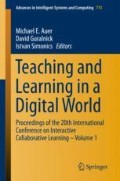Abstract
The present study investigates the extent to which the popular game-based online platform of Kahoot can be used as a creative and effective tool in the teaching practice and specifically in the teaching of basic concepts of electric circuits. A comparative study was conducted for this reason with two groups of 67 learners in total, where the experimental group participated in the design of their own questions within the framework of formative assessment with the use of Kahoot, whereas the second group followed a traditional way for their assessment. According to the results, the integration of Kahoot in the teaching process improved learners’ understanding of certain concepts on electric circuits, enhanced their active participation in the lesson, motivated them towards learning and constituted a creative and fun-tool to use for teaching purposes.
Access this chapter
Tax calculation will be finalised at checkout
Purchases are for personal use only
References
Sharma, A., Gandhar, K., Sharma, S., Seema, S.: Role of ICT in the process of teaching and learning. J. Educ. Pract. 2(5), 1–5 (2011)
Wendy, M.: Not just tools: the role of E-technologies in culture of learning. Educ. Commun. Inf. 1(2), 229–235 (2001)
Lucke, Τ., Keyssner, U., Dunn, P.: The use of a classroom response system to more effectively flip the classroom. In: IEEE Frontiers in Education Conference, October 2013, pp. 491–495 (2013)
Duncan, D.: Clickers in the Classroom. Pearson, San Francisco (2004)
Owusu, A., Weatherby, N., Otto, S., Kang, M.: Validation of a classroom response system for use with a health risk assessment survey. Poster session at the 2007 AAHPERD National Convention and Exposition, Baltimore, Maryland (2007)
Abramson, D., Pietroszek, K., Chinaei, L., Lank, E., Terry, M.: Classroom response systems in higher education: meeting user needs with NetClick. In: IEEE Global Engineering Education Conference (EDUCON), March 2013, pp. 840–846 (2013)
Collins, K.: Kahoot! is gamifying the classroom (2015). http://www.wired.co.uk/article/kahoot-gaming-education-platform-norway
Diaz, C., Trejo, C.: Kahoot: The Student-Teacher Interactive Classroom Tool (2015)
Meijen, C.: Kahoot: using a game based classroom response system in teaching. School of Sport and Exercise Science, University of Kent (2015)
Sunde, M.T., Underdal, A.G.: Investigating QoE in a cloud-based classroom response system, a real-life longitudinal and cross-sectional study of Kahoot. Master of Science in Communication Technology, Norwegian University of Science and Technology, Norway (2014)
Fotaris, P., Mastoras, T., Leinfellner, R., Rosunally, Y.: Climbing up the leaderboard: an empirical study of applying gamification techniques to a computer programming class. Electron. J. e-Learn. 14(2), 94–110 (2016)
Wang, A.I.: The wear out effect of a game-based student response system. Comput. Educ. 82(C), 1–24 (2015)
Driver, R.: Students’ conceptions and the learning of science. Int. J. Sci. Educ. 11(5), 481–490 (1989)
Shipstone, D.M.: A study of children’s understanding of electricity in simple DC circuits. Eur. J. Sci. Educ. 6(2), 185–198 (1984)
Psillos, D., Koumaras, P., Valassiades, O.: Pupils’ representations of electric current before, during, and after instruction on DC circuits. Res. Sci. Technol. Educ. 5(2), 185–199 (1987)
Engelhardt, P.V., Beichner, R.J.: Students’ understanding of direct current resistive electrical circuits. Am. J. Phys. 72(1), 98–115 (2003)
Baser, M.: Effects on conceptual change and traditional confirmatory simulations on pre-service teachers’ understanding of direct current circuits. J. Sci. Educ. Technol. 15(5), 367–381 (2006)
Moore, C.J., Rubbo, L.J.: Scientific reasoning abilities of non-science majors in physics-based courses. Phys. Rev. STPER, 8(1), 1–18 (2011)
Author information
Authors and Affiliations
Corresponding author
Editor information
Editors and Affiliations
Rights and permissions
Copyright information
© 2018 Springer International Publishing AG
About this paper
Cite this paper
Tsihouridis, C., Vavougios, D., Ioannidis, G.S. (2018). Assessing the Learning Process Playing with Kahoot – A Study with Upper Secondary School Pupils Learning Electrical Circuits. In: Auer, M., Guralnick, D., Simonics, I. (eds) Teaching and Learning in a Digital World. ICL 2017. Advances in Intelligent Systems and Computing, vol 715. Springer, Cham. https://doi.org/10.1007/978-3-319-73210-7_70
Download citation
DOI: https://doi.org/10.1007/978-3-319-73210-7_70
Published:
Publisher Name: Springer, Cham
Print ISBN: 978-3-319-73209-1
Online ISBN: 978-3-319-73210-7
eBook Packages: EngineeringEngineering (R0)

